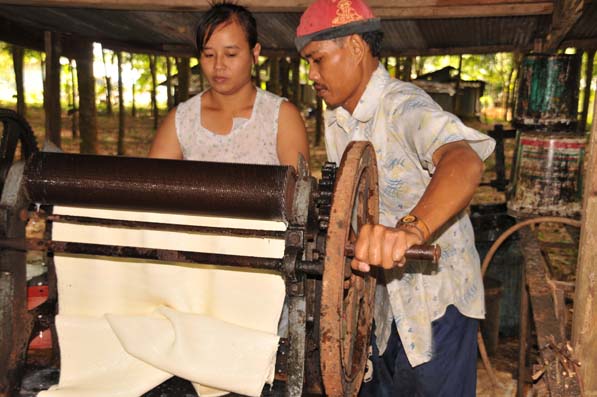Home Stretch

Many Burmese working in Thailand’s rubber industry extend their stay indefinitely, as dreams of returning home with substantial savings prove elusive
With rubber plantations covering nearly four percent of its total land area, Thailand is the world’s largest producer and exporter of rubber. But achieving an output of more than three million tons of rubber each year takes more than just vast expanses of land. It also requires a huge workforce, and in Thailand, this comes largely courtesy of neighboring Burma.
 |
| Tapping is done at night, when lower temperatures allow the latex to flow more freely. (Photo: MIN OO/THE IRRAWADDY) |
For people like Yin Htwe and Aye May, a Burmese couple who have worked at a rubber plantation in southern Thailand for the past seven years, the appeal of the job is obvious. Unlike in Burma, where most people live a hand-to-mouth existence, working in Thailand offers them a chance to put some money aside for the future—or, in their case, to build a house back home.
They said their dream home would cost 500,000 baht (US $16,000)—more than they could ever hope to save in a lifetime in their own country. “In Burma, we could never earn enough to build our own home, so that’s why we came here,” said Aye May.
But even in Thailand, saving that amount of money is a struggle, due to the relatively high—and constantly rising—cost of living. Meanwhile, fluctuations in the value of rubber and other vicissitudes of an industry that is extremely sensitive to both economic and environmental conditions mean that it is sometimes difficult to earn enough just to get by.
Even on a day-to-day basis, rubber plantation workers can never be sure how much money they will make. Because the rubber sap, or latex, doesn’t run when the temperature rises above 29 degrees Celsius, the trees can only be tapped at night. But if it rains just before dawn and water mixes with the latex, the whole night’s work will be lost.
If they manage to safely collect the sap, they are assured of making some money. How much, however, depends entirely on market forces far beyond their control.
“A sheet of raw rubber sells for around 100 baht ($3.20) per kilogram right now,” said Yin Htwe. “The boss takes 60 percent, so that means we earn about 40 baht ($1.30) per kilo.”
Last year, however, the price of rubber fell to just 25 baht ($0.80) a kilogram, making life very difficult for Yin Htwe and his wife.
“At that price, we could hardly scrape by, much less save for a house in Burma,” said Aye May, adding that their daily expenses have risen steadily since coming to Thailand due to inflation, making it that much harder to save.
Amid such economic uncertainty, there are also other worries facing Burmese migrant workers in the Thai rubber industry. Although some may stay at one plantation for 15 or 20 years, it is becoming increasingly difficult for newcomers to find work. But even those with secure jobs will sometimes leave them if they feel threatened by local Thai gangs, who often target Burmese working alone at night on the vast plantations.
Robbery, rape and even murder are not unusual occurrences for Burmese workers in Thailand’s restive south, where 80 percent of the county’s two million hectares (five million acres) of rubber plantations are located. With no real protection from such threats, most will simply move on to avoid a potentially deadly confrontation.
“One day, one of my friends found a cheroot in a cup used to collect latex. Everyone knows that this is a warning—a sign that someone wants to kill them. My friend left the plantation immediately to try to find another job somewhere else,” said Yin Htwe.
Despite such dangers, Yin Htwe and Aye May say that Thailand will likely remain their home for some years to come—assuming the Thai authorities allow them to stay. Like tens of thousands of other Burmese working in the Thai rubber industry, they know that there are few opportunities to return to in Burma.
1 | 2 next page »
